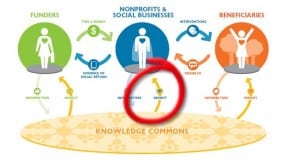What are the skills and mindsets that nonprofits need to embrace data for social change? Guest blogger Beth Kanter talks about data-literacy as an in-house necessity for nonprofits.
In a resource constrained world, many nonprofits view measurement and data as “yet anotherthing on our to-do list” or as a lost cause because “we don’t have that expertise on staff.”
While many nonprofits are using social media and networks, few are effectively using data to measure the results.
While writing the book Measuring the Networked Nonprofit: Using Data to Change the World with measurement expert, KD Paine, I spent most of 2011 thinking about how nonprofits could reap insights from data. The book demonstrates how nonprofits can use their data to improve their networked approaches for social change. The frameworks and tips we outlined were tested in real-time as part of my work as Visiting Scholar at the Packard Foundation with their grantees.
I discovered that the biggest challenge for many was not necessarily collecting or organizing data, although those are real challenges. The far bigger issue is making sense of it all. And the first step forward is a mind shift toward becoming a data-informed nonprofit organization.
In the private sector, on of the most sought-after professionals today is the data scientist and there are important discussions taking place about data literacy. “Data Scientist” is a newly defined job that requires being part data geek, analyst, communicator, visualizer, storyteller, and interpreter. This individual works with program experts to apply what is learned from the data. Most nonprofits would not have the resources to hire one of these in-demand professionals.
The goal is to build this capability in-house, but when that is not an immediate option, there are a few solutions for the interim. Jake Porway, founder of Data Kind (formerly Data Without Borders) and a self-described “data scientist with a social mission” offers one solution: a volunteer matching service that pairs nonprofit organizations with data scientists to help these organizations leverage big data from multiple sources for social change.
Working with volunteers who have professional skills is nothing new to nonprofits. In a more recent evolution, the Analysis Exchange has been matching analytics experts from the private sector with nonprofits to help set them up a system for collecting their web data and understanding it. A step closer to in-house capability would be for nonprofits to direct the tools they already use to recruit board members, staff, and volunteers, e.g. LinkedIn, toward finding people to help them with their data.
To reap the benefits of big data for social change, nonprofits must develop the organizational culture and skill set that allows them to embrace it themselves. While it may be indispensable at times to bring in an expert data scientist to advise, being data-informed and data-literate must become part of the nonprofit’s DNA.
Data literacy is about having leadership that is always asking, “What does the data mean?” It’s about leadership that values the difference between hunches and data-informed decisions.
Most importantly, data-informed organizations are able to develop a culture of intense curiosity that enables them to dig beneath the surface of a problem, create a hypothesis, formulate questions, and use the data to help learn.
DoSomething.org, is an example of a nonprofit that has built this kind of data infrastructure. They have two staff data analyst positions, and, as part of their data-informed culture they have made data literacy an essential competency for everyone in the organization. The leadership has acknowledged the change in their decision-making processes. It isn’t about just collecting data or being “driven by data.” It is an enterprise-wide commitment to collecting the right data, asking the right questions, and bringing their organizational vision and wisdom to interpreting it.
The result is a shift from ad hoc data analysis and simple (though detailed) record-keeping to a systematic approach to improving their programs and campaigns by using data.
All staff in nonprofits need skills in learning how to swim in the data , make discoveries and communicate what it means to improve their programming. This means learning skills for visual display of data and information as well as the ability to tell a clear and compelling story – even if it shows that something didn’t work. This competency can’t be outsourced to consultants. It must reside within the organization.
What are the best strategies for helping nonprofits develop a data-informed culture in order to master the skills of data literacy? Do you have examples of nonprofits that have done this?
Let us know.

